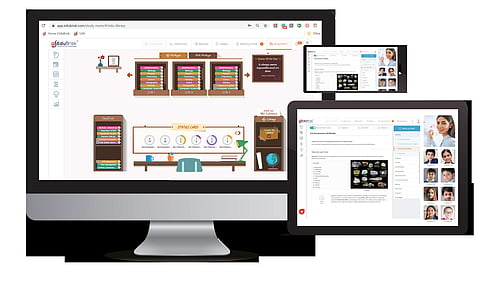

Schools are in a desperate need to go digital and do so quickly. So would going digital in 24 hours suffice? That's the proposal put forth by Kochi-based start-up EduBrisk Knowledge Solutions. Officially called Classroom to Virtual Classroom within the next 24 hours, this EdTech platform takes schools online, trains teachers and crafts an online classroom experience so unique that within about two months of offering to change things around for schools, 26 of them including GD Goenka Public School, Siliguri, QMS Schools, Kolkata, St Peters, Ernakulam, BPMS, Trivandrum, Paradise Public School, Varkala are on board and from what we hear, another 22 to 25 schools are in the pipeline. To find out what they are doing right, we spoke to Founder of EduBrisk, Saiju Aravind.
The beginning of it all
Aravind was a commander in the Navy till 2008 and he was also a scientist with the Defence Research Development Organisation until he saw his son struggling with academics. He quit his job, took up Montessori training and even went to the extent of reading about Neuroscience. Not only did his son perform better, he realised that he could help others as well. Hence, he started EduBrisk in 2014 to lend a holistic approach to learning. It was on March 16, 2020 that they started digitising schools and there first two schools were in Kolkata with a combined strength of 3,000 students and 120 teachers. "We trained the teachers on March 21, 22 and 23 and then released we can reduce the time and that's how the model came to be," says the entrepreneur and educationist.
The order of things is that the schools are first given a demo and made to understand that this digitisation will be helpful to them beyond the lockdown. Once they are on-boarded, the email ID, phone numbers and the details of the teachers like which subject they teach is taken. The teachers are taken through four programmes that familiarise them with digital tools, EduBrisk's content, assignments and so on. "Just getting on a video conference where the teacher goes on and on is a crude and elementary way of teaching online, what we offer is more evolved," says Aravind.
Take for example their pre-learning and diagnostic testing tools. These are taken by students before the class and it requires a mere five to ten minutes. These are a set of questions that try and understand how much of the foundations of a particular concept are students familiar with. "Suppose the teacher is going to take up a class on the French Revolution for which students need to be familiar with terms like landlords, oligarchy, feudalism and so on. So these tests check if the student knows the foundation, then their answers are analysed and the entire record is presented to the teacher on their dashboard. This helps teachers understand what students lack knowledge in so that they can take it up in class. It really helps them homogenise the class. Also, this is a solution to remedial classes. Instead of picking out students who don't understand concepts after class and making them feel like second-class citizens through extra classes, the teachers can get an insight into what they know and don't know in the beginning itself," he explains in detail.
And tech-challenged teachers need not worry, faculty from EduBrisk will see them through the first few online classes. They also have a bank of 2,50,000 questions that the teachers can choose from to give as assignments. They can add their own questions, edit what we have or change it according to their needs.
Let's go online
EduBrisk is also sensitive to the fact that experienced teachers might not be comfortable enough to learn about technology from a youngster and similarly, the youngsters might not understand what exactly the teachers are struggling with. So they have older teachers out of the 26 trainers they have to make matters smooth. "All this is possible only when the management is progressive and proactive and parents are also equally enthusiastic about the idea," says Aravind who has developed the whole platform with entrepreneurs, educationists, scientists, child psychologists, teachers, parents and students as well. They conduct these classes through any medium that schools are comfortable with. "Corona is a bad bargain and we must make the best out of it," believes the entrepreneur who has handled over 1,000 faculty development programmes in India and abroad. And through EduBrisk, he wants to help educational institutions make the most of it.
For more on them, check out edubrisk.com
